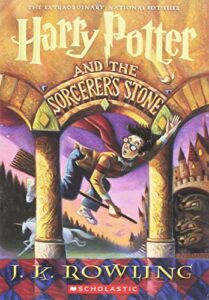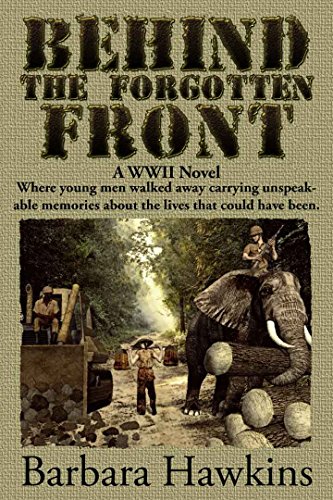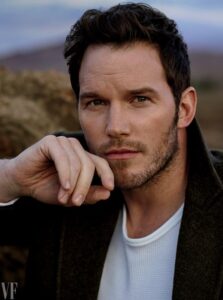
Following find an interview with author Barbara Hawkins.
What is the name of the book and when was it published?
Behind the Forgotten Front, A WWII Novel, published August 2014.
What’s the book’s first line?
How could life be better?
What’s the book about? Give us the “pitch”.
This isn’t another romantic WWII ‘boy goes to war’ tale. Instead, it’s about Harry Flynn’s struggle with himself as he helps an Afro-American regiment build the ‘road to nowhere’ through the Himalayan Mountains and Japanese-occupied Burma. Then later Harry joins America’s first guerrilla-supported units, Merrill’s Marauders, and Mars Task Force. Through the unbreakable bonds of friendship, malaria, the smell of fear, loneliness and the enemy are overcome. It’s not about heroes but about people; soldiers who may have been good men even if they weren’t brave. The lessons learned in World War II apply to all wars, where soldiers walk away carrying unspeakable memories and are haunted by the lives that ‘could have been.’ Behind the Forgotten Front brings them all back to life and shows that history is about facts driven by passions and sometimes the mistakes of real people.
What inspired you to write the book? A particular person? An event?
This is the story my father never could write. When Merrill’s Marauders’ 2,750-man force was depleted to 247 soldiers, the men of Mars Task Force were sent in to carry on the fight. My father was one of the Mars Task Force. I used his diary to acknowledge the men who never came home.
What’s the main reason someone should really read this book?
There is so much written about the war in Europe. Most people don’t even know there was a China-Burma-India Theater. At one point in time, the Japanese on the Pacific front almost connected with Hitler’s western front. If they hadn’t been stopped in Burma, the Axis Powers would have controlled the entire landmass from the Atlantic to the Pacific Oceans, and the war may have ended differently. This book is a tribute to those unsung heroes who made that difference.
What’s the most distinctive thing about the main character? Who-real or fictional-would you say the character reminds you of?
The main character, Harry Flynn, wanted to be a hero and do the right thing. Like many young soldiers, he was naïve about how wars are fought and won. On the battlefield, he came of age and the bitter taste of War changed him, forever. In the end, he was still alive and owed it to those who didn’t make it back to never forget the cost of freedom.
Audie Murphy, who was the most decorated soldier in WWII had many of the same challenges as Harry. A father that deserted the family, a romantic notion of war, he was a rebel, and in the end, he suffered post-traumatic stress syndrome, as did Harry.
If they made your book into a movie, who would you like to see play the main character(s)?
Chris Pratt may be a little old, but he has the all-American boy next door look and an idealistic image that good will triumph over bad.
When did you first decide to become an author?
When my daughter went off to college, I finally had time to write. My first attempt at writing was about the Guatemalan civil war, which I saw firsthand while living there. But I wasn’t ready to share those emotions, and my writing showed it. Instead, I decided to write the story my father had wanted to write for the men who never came home from WWII.
Is this the first book you’ve written?
Yes, Behind the Forgotten Front is my first book.
What do you do for work when you’re not writing?
Adventure travel is a hobby I’ve had since before it had a name.
How much time do you generally spend on your writing?
I try to log in about four hours of writing each day. As much as I enjoy writing, I like living, too.
What’s the best and the hardest part of being an indie?
The big publishers get dibs on display windows and shelf space in bookstores. So, without a recognizable name, it was hard for my book to get attention. My book is just one of the thousands on a list of indie books published each year by other good writers. It’s hard to distinguish myself when I feel like a needle in a haystack. Still, I continue to poke around for niches that fit my book and will reach the right audience.
What’s a great piece of advice that you can share with fellow indie authors?
I suggest new authors put effort into writing several short stories that can get published in well-read magazines before they publish a novel. Once released, their name will come up on a Google or book search, giving them credibility when a reader is trying to decide whether they want to invest time reading their book.
Would you go traditional if a publisher came calling? If so, why?
I’d go the traditional publisher route to see how much visibility they could get me. But that assumes the publisher understands my book and my audience. I’ve heard stories where traditional publishers spent marketing money on audiences that did not fit the book. Neither the author or publisher was happy with the results.
Is there something in particular that motivates you?
I’m writing science fiction fantasy novels now for young adults. At one point in my life, I taught science and mathematics. Hopefully, I can present scientific ideas to a young audience in a way that motivates them to want to give math and science a second chance and opens a world of limitless potential for their imagination.

J.R.R. Tolkien pulled us into worlds we never could have found without him.
Which book do you wish you could have written?
I was delighted with J.K. Rolling’s imagination in Harry Potter and the Sorcerer’s Stone.

